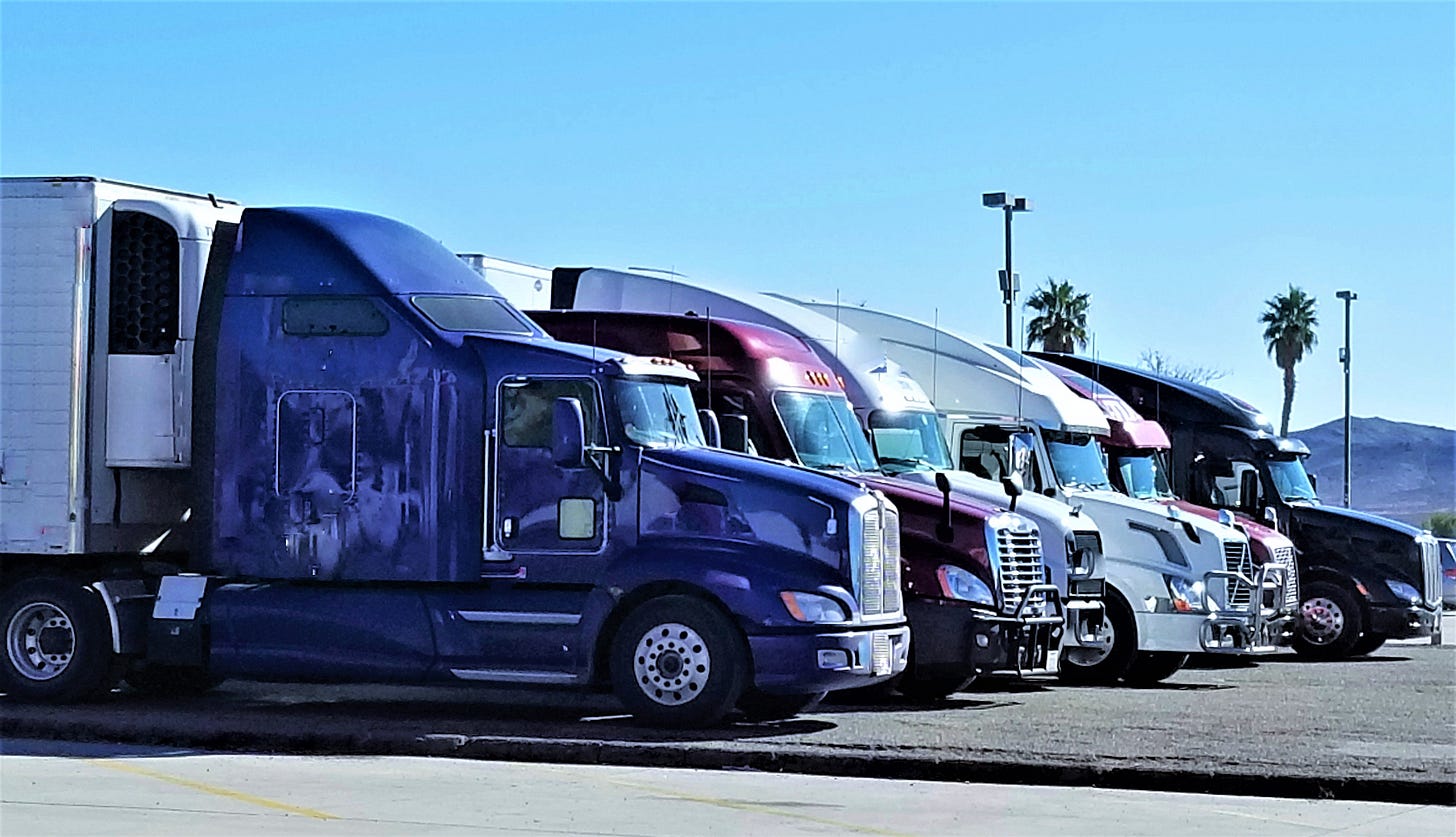The Electric Truck Nightmare: Biden's Agenda Bulldozes American Truckers
Trucks Keep America's Wheels Turning
Trucks Keep America's Wheels Turning
We rely on hard-working truck drivers to move goods across this vast nation. From the fresh produce at the grocery store to the living room couch you're seated on right now - if you purchased it, a trucker delivered it. The American Trucking Associations reports these highway warriors transported an outstanding 11.5 billion tons of freight in 2022. That's roughly 72% of the total tonnage shipped nationwide last year.
Without truckers, America's well-oiled logistics and supply chains wouldgrind to a halt. Every product, commodity, and manufactured good relies on these dedicated men and women getting behind the wheel to keep goods flowing. Whether it's a refrigerated semi hauling perishable foods or a flatbed trailer stacked with construction materials, our economy and way of life depends on truckers.
Fantasy Versus Reality
But now, President Biden wants to force trucking companies and independent owner-operators into expensive, unproven electric truck technology through a set of aggressive new environmental rules. The harsh reality is that battery-powered big rigs are simply nowhere close to being a viable, cost-effective replacement for modern diesel trucks right now. Just ask veteran owner-operator Mike Nichols.
"Even if they subsidized the cost 100%, I still would refuse because I'd go broke. That's how useless they are," stated Nichols, who has 30 years of trucking experience under his belt. "If they gave me one of these things, I still wouldn't take it."
The numbers bear out Nichols' skepticism. Premium electric semi-trucks like Tesla's top model max out at around 500 miles of range per charge under perfect conditions. Meanwhile, a conventionally-powered diesel semi can crusher over 1,500 miles - and often up to 2,000 miles - on a single affordable tank of fuel. That's a massive advantage.
Charging times expose another frontier where electric trucks fall disastrously short. Getting an electric big rig's batteries fully juiced up can consume up to 3 painstaking hours plugged into a high-powered charging station. A diesel truck, by contrast, can refill its tanks in 20 minutes or less at any truck stop.
The hurdles don't end there. Truckers frequently voice concerns about battery performance degrading in cold weather conditions for electric models. There are also questions about whether battery-powered trucks could effectively run critical auxiliary equipment that relies on the diesel engine's power takeoff, such as hydraulic systems to operate truck bed hoists.
Sponsor Ad
AI Discovers $22 Trillion Gold Mine (Video)
Two of Silicon Valley’s most secretive billionaires have made a world-changing AI discovery.
It places them at the center of a $22.1 trillion boom. And they’re giving everyday investors the chance to join them.
A 40-year AI pioneer projects this firm’s valuation could soar 5,000% within a decade.
(Full story…)
Costs Through the Roof
Compounding the technological limitations is the astronomical price tag for electric trucks. Current models can cost around $300,000 on average, according to industry estimates. That's roughly double the $150,000 average cost for a brand new diesel semi-truck.
For many American truckers, especially small business owners and independent operators, that premium is an utterly insurmountable financial hurdle. Lewie Pugh, executive vice president of the Owner-Operator Independent Drivers Association (OOIDA), warned the new rules could "bankrupt" mom-and-pop trucking companies.
"This administration just continues putting out regulations on truckers and small businesses without any real knowledge or trying to get knowledge of what these truckers go through. It's just so frustrating," Pugh stated.
But even for larger fleets, the total costs extend far beyond the price of the vehicles themselves. The U.S. currently has only around 160,000 public charging ports suitable for trucks. Analysts project a staggering 28 million such ports would be required by 2030 to support mass adoption of electric trucks. Building that vast charging network is an economic burden of immense proportions.
Upgrading America's aging power grids and electrical infrastructure to handle such a massive new load is another costly missing link. A December 2022 study determined fully electrifying the nation's transportation sector would necessitate a 40% increase in total generation and transmission capacity across the existing grid. Those are multi-trillion dollar price tags.
Politics Over Practicality
Despite all the glaring practical barriers, technological deficiencies, and extreme costs involved, the Biden Administration is barreling full speed ahead with these regulations. The Environmental Protection Agency has acknowledged it will simply "monitor implementation" once the rules start taking effect for model year 2027 vehicles in 2026.
In other words, the White House is comfortable instituting a policy revolution in the trucking industry while admitting they'll have to assess the aftermath and unforeseen consequences as they occur. It's yet another troubling case of high-ranking politicians and bureaucrats dictating sweeping changes in a vital economic sector without properly consulting the experts and workers who will bear the brunt of those changes.
"This administration keeps issuing regulations without any real knowledge of what truckers have to go through," reiterated Pugh. Groups like OOIDA argue the regulations demonstrate a fundamental disconnect between DC policymakers and the on-the-ground realities confronting American truckers.
At the end of the day, this draconian electric truck policy seems to be more about scoring political points by checking off boxes for the White House's green energy agenda rather than implementing prudent, realistic proposals. Our nation's leaders owe it to hard-working truckers - and all American workers - to avoid recklessly disrupting and potentially bankrupting crucial industries through overreaching regulations that blatantly ignore basic economic facts.
These unsung heroes of the highways quite literally keep our supply chains, economy, and modern lifestyles functioning. They deserve better than having their livelihoods jeopardized by misguided policies this disconnected from the technological and economic realities they grapple with daily. If the American truckers who move this nation's goods can't afford this transition, then neither can we as a country.
James Reagan





